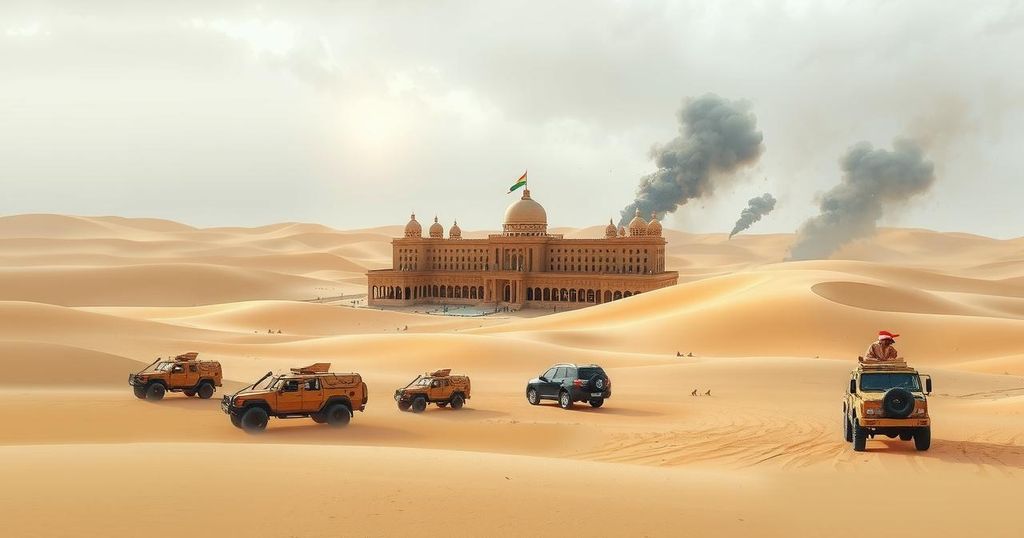Will the Recapture of the Presidential Palace Alter the Course of the Sudan War?
The Sudanese Armed Forces have reclaimed the presidential palace in Khartoum, marking a pivotal advance against the paramilitary RSF after two years of conflict. Despite capturing strategic territory, the RSF retains presence and capability within the city. Humanitarian crises intensify amid the fighting; future governance over Sudan remains uncertain with ongoing hostilities likely to continue.
The Sudanese Armed Forces (SAF) have made significant progress in their offensive against the paramilitary Rapid Support Forces (RSF), notably reclaiming the presidential palace in Khartoum. This marks an important milestone after losing control of the capital early in the ongoing conflict, which has persisted for two years. Despite this advancement, the military faces a formidable challenge as the war continues with much yet to be resolved.
The reclamation of the presidential complex, which includes the historic Republican Palace, conveys a strategic victory for the military-led government, reinforcing its narrative as the legitimate authority battling a “terrorist militia.” Following the clearance of peripheral districts in greater Khartoum, the SAF has regained substantial territory, compelling RSF forces to retreat from crucial locations, including government buildings and the General Headquarters.
However, the extent of changes to the frontline remains uncertain, with RSF fighters still present in Khartoum. Notably, the RSF managed to conduct retaliatory strikes, demonstrating their ongoing capability despite facing pressure. This situation portends further violent confrontations as the SAF seeks to eliminate remaining RSF units.
The conflict has generated a complex regional divide, with General Mohamed Hamdan Dagalo (Hemedti) leading the RSF, which retains significant control over most of Darfur, while General Abdel Fattah al-Burhan heads the military-backed government overseeing eastern and northern regions. Their previous alliance dissolved into a power struggle that ignited this civil war in April 2023.
Achieving full control of Khartoum could empower the SAF to extend its dominance over central Sudan, potentially applying pressure on RSF strongholds like El Fasher. Yet many experts caution that such developments might lead to further territorial entrenchment rather than unify the country. The RSF, asserting its presence, has been attempting to establish a parallel governance structure in areas under its influence.
Sudans’ citizens are suffering immensely due to the civil war, which has resulted in extensive humanitarian crises. With over 12 million displaced and widespread famine risk, changing control within Khartoum could significantly impact humanitarian conditions. However, as both factions are accused of hindering emergency aid, the adverse circumstances are unlikely to improve substantially in the short term.
While the SAF’s recent gains are seen as steps toward a broader military victory, the International Crisis Group suggests that establishing comprehensive governance over Sudan remains elusive. Both parties remain resolute to continue their struggle for dominance, while previous attempts to reignite peace negotiations have not yielded positive outcomes.
The recapture of the presidential palace by the Sudanese Armed Forces signals a meaningful development in the ongoing conflict with the Rapid Support Forces. Although this milestone may boost the army’s claim to legitimacy, the war remains fiercely contested with no clear resolution in sight. Humanitarian conditions are dire across the country, and continued hostilities pose significant challenges both militarily and for civilians, suggesting that the resolution to Sudan’s crisis is far from imminent.
Original Source: www.bbc.com




Post Comment